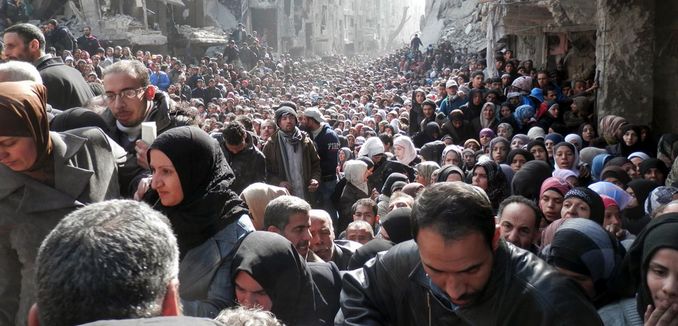More than 450 Palestinians were tortured to death in Syrian prisons since the outbreak of that country’s civil war, with 1,100 others remaining in regime custody and thousands fleeing abroad, veteran Palestinian affairs correspondent Khaled Abu Toameh reported on Monday.
Abu Toameh observed that while numerous foreign journalists are eager to report on Palestinians living in the West Bank or the Gaza Strip, the same media outlets “seem to prefer turning a blind eye to the plight of Palestinians living in Arab countries.”
This oversight “harms first and foremost the Palestinians themselves and allows Arab governments to continue their policies of persecution and repression,” he wrote. “Palestinians in Syria are being murdered, tortured, imprisoned and displaced. The West yawns.”
Abu Toameh cited an Arabic report on the plight of Syrian Palestinians in 2016, which stated:
The last year was hell for these Palestinians and its harsh consequences will not be erased for many years to come. During 2016, Palestinians in Syria were subjected to the cruelest forms of torture and deprivation at the hands armed gangs and the ruling Syrian regime. It is hard to find one Palestinian family in Syria that has not been affected.
The regime of Syrian President Bashar al-Assad has not given families any information about the bodies of the 456 Palestinians killed while imprisoned, nor does it provide statistics about its detainees or grant the Red Cross access to the 1,100 prisoners.
More than 3,400 Palestinians have been killed over the course of the Syrian civil war, according to a report published by the Action Group For Palestinians of Syria. “[Nearly] 80,000 Palestinians have fled to Europe, while 31,000 fled to Lebanon, 17,000 to Jordan, 6,000 to Egypt, 8,000 to Turkey and 1,000 to the Gaza Strip,” the report added. Almost 200 Palestinians were said to have died of starvation or malnutrition due to sieges perpetrated by the Assad regime.
“Alarmed by the indifference of the international community to their plight, Palestinians in Syria have resorted to social media to be heard in the hope that decision-makers in the West or the UN Security Council, obsessed as they are with Israeli settlements, might pay attention to their suffering,” Abu Toameh wrote.
The latest campaign is called “Where are the detainees?” and aims to raise awareness about Palestinians who have been arrested by the Assad regime. According to its organizers, 54 Palestinian minors have been tortured to death in Assad’s prisons.
Another report cited by Abu Toameh claimed that 80 percent of Palestinians in Syria have lost their jobs or businesses, forcing children to find work to help support their families.
“Yet to the international community and Western media, these figures and reports about the Palestinians in Syria are ho-hum at best,” Abu Toameh observed. “The Arab countries care nothing about the Palestinians in Syria who are being killed, tortured and starved to death. In the Arab world, human rights violations are not news. When human rights are respected in an Arab country, that is news.”
Meanwhile, the Palestinians’ leaders “are too busy ripping out each other’s political throats to be bothered with the welfare of their people, being smothered under the undemocratic and repressive regimes of the Palestinian Authority and Hamas,” Abu Toameh wrote. He noted that Palestinian Authority President Mahmoud Abbas has been protesting the possible move of the American embassy to Jerusalem, but has been disinerested in “the killing, torture and displacement of Palestinians in an Arab country.”
Abu Toameh concluded with a rebuke of the international community’s priorities:
It remains to be seen whether the UN Security Council will get its priorities straight and hold an emergency session to discuss the murderous campaign against Palestinians in Syria. Perhaps, somehow, this will overtake “settlement construction” as a topic worthy of world condemnation.
In Yarmouk and the Failure of Palestine Solidarity, which was published in the May 2015 issue of The Tower Magazine, senior editor Ben Cohen concluded:
If the story of Yarmouk tells us anything, it is that the Palestinian national movement and its supporters profoundly lack both intellectual imagination and moral integrity. Yarmouk might have been an opportunity for the Palestinian solidarity movement to re-examine its entire world view, now that an Arab regime is turning the descendants of the original Palestinian refugees into refugees themselves. Such a process would not necessarily lead to a meaningful transformation of the Palestinian view of Israel. But it could trigger a more honest appraisal of the role of Arab regimes in delaying a final resolution of the Palestinian issue, as well as recognition that the successive generations of Syrian-born Palestinians genuinely belonged to a country now ravaged by the worst humanitarian crisis since the Second World War.
To think in this way, though, would put the interpretation of the Nakba as an ongoing Israeli sin at risk, by introducing additional layers of unwelcome complexity. If Netanyahu can be called a war criminal, then why not Assad? If Palestinians in Yarmouk need solidarity and assistance now, how does talk of 1948 and the “right of return” help them? These and similar questions remain unasked by those who paraded through our streets with Palestinian flags last summer. Until they start asking them, more Palestinians will die in Syria and elsewhere in the Arab world.
[Photo: Rami Al Sayyed/UNRWA/ Flickr ]




